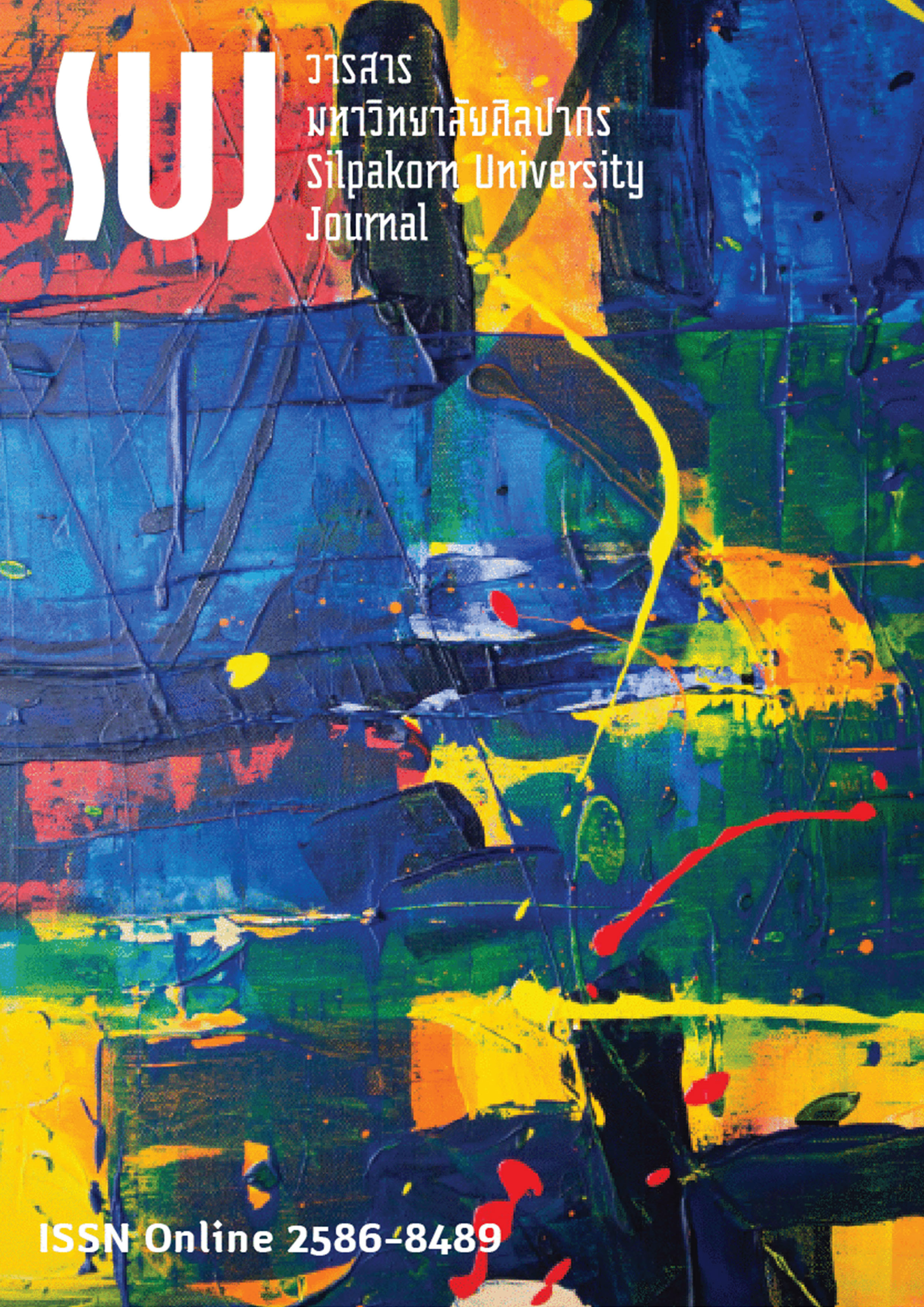พฤติกรรมสารสนเทศทางการเมืองของเยาวชนในสามจังหวัดชายแดนภาคใต้ (Political information behavior of youths in three southern border provinces)
Main Article Content
Abstract
งานวิจัยนี้มีวัตถุประสงค์เพื่อศึกษาพฤติกรรมสารสนเทศทางการเมือง และศึกษาการตัดสินใจในการมีส่วนร่วมทางการเมืองของเยาวชนในสามจังหวัดชายแดนภาคใต้ เป็นการวิจัยเชิงสำรวจ โดยใช้แบบสอบถามกับกลุ่มตัวอย่างที่เป็นเยาวชน อายุตั้งแต่ 18-25 ปี ที่มีภูมิลำเนาอยู่ในพื้นที่สามจังหวัดชายแดนภาคใต้ ได้แก่ จังหวัดปัตตานี จังหวัดนราธิวาสและจังหวัดยะลา จำนวน 330 คน โดยใช้วิธีการสุ่มตัวอย่างแบบบังเอิญ และวิเคราะห์ข้อมูลด้วยค่าสถิติร้อยละ ค่าเฉลี่ยการแจกแจงความถี่ และส่วนเบี่ยงเบนมาตรฐาน ผลการวิจัยพบว่า 1) พฤติกรรมสารสนเทศทางการเมืองของเยาวชนประกอบด้วย 1.1) ความต้องการสารสนเทศทางการเมืองอยู่ในระดับมาก (X̅ = 4.17) โดยต้องการสารสนเทศเกี่ยวกับการพูดคุยประเด็นทางการเมืองสูงที่สุด (X̅ = 4.27) 1.2) การแสวงหาสารสนเทศทางการเมืองอยู่ในระดับมาก (X̅ = 3.54) โดยแสวงหาสารสนเทศจากแหล่งอินเทอร์เน็ตสูงที่สุด (X̅ = 4.41) และ 1.3) การใช้สารสนเทศทางการเมืองอยู่ในระดับปานกลาง (X̅ = 3.47) โดยมีการใช้สารสนเทศในด้านการใช้สิทธิเลือกตั้งสูงที่สุด (X̅ = 3.83) ทั้งนี้ มีการใช้โทรศัพท์เป็นเครื่องมือในการเปิดรับสารสนเทศจากเครือข่ายสังคมออนไลน์มากที่สุด โดยคิดว่าคุณภาพของสารสนเทศส่วนใหญ่ตรงกับความต้องการและนำไปใช้ในการตัดสินใจทางการเมืองได้ และ 2) การตัดสินใจในการมีส่วนร่วมทางการเมืองอยู่ในระดับปานกลาง (X̅ = 3.33) โดยมีส่วนร่วมในด้านการใช้สิทธิเลือกตั้งสูงที่สุด (X̅ = 3.79) ทั้งนี้ มีการตัดสินใจมีส่วนร่วมทางการเมืองในด้านการบริจาคเงินสนับสนุนและระดมทุนน้อยที่สุด ซึ่งอยู่ในระดับปานกลาง (X̅ = 2.97) โดยผลจากงานวิจัยนี้ สามารถสะท้อนให้เห็นถึงความรู้ความเข้าใจในเรื่องการเมืองของเยาวชน และสามารถนำไปสู่แนวทางการพัฒนาสารสนเทศที่สามารถตอบสนองต่อความต้องการ เพื่อให้เยาวชนมีพฤติกรรมทางการเมืองที่อยู่บนพื้นฐานของความรู้ความเข้าใจเกี่ยวกับการเมืองภายใต้กฎหมายรัฐธรรมนูญแห่งราชอาณาจักรไทยได้
The objectives of this research were to study political information behavior and to study the decision-making process regarding political participation among youth in the three southern border provinces. This survey research was conducted using questionnaires with a sample of youths aged 18-25 years who were residents of the three southern border provinces, namely Pattani, Narathiwat, and Yala. The sample size consisted of 330 individuals selected through the random sampling method, and the data were analyzed using percentages, means, frequency distributions, and standard deviations. The results indicated the following: 1) Political information behavior consists of: 1.1) A high level of need for political information (X̅ = 4.17), with the highest need for information about political discussions (X̅ = 4.27). 1.2) A high level of political information seeking (X̅ = 3.54), with the highest preference for seeking political information from internet sources (X̅ = 4.41). 1.3) A moderate level of political information usage (X̅ = 3.47), with the highest usage related to voting rights (X̅ = 3.83). Additionally, the use of mobile phones were the most commonly used tool for accessing information from online social networks. The participants perceived the quality of political information received through these channels as largely meeting their needs and utilizing it in their political decision-making processes. 2) The decision-making regarding political participation was at a moderate level (X̅ = 3.33), with the highest level of involvement observed in exercising voting rights (X̅ = 3.79). However, there was relatively less involvement in political decision-making related to financial contributions and fundraising, which was at a moderate level (X̅ = 2.97). The findings from this research reflect the knowledge and understanding of politics among youths and can contribute to the development of information resources that can meet their needs. This can help cultivate political behaviors among youths based on their knowledge and understanding of politics within the framework of Thai constitutional law.
Downloads
Article Details

This work is licensed under a Creative Commons Attribution-NonCommercial-NoDerivatives 4.0 International License.
References
Abdulroh, K. (2006). Basic Muslim Handbook: The Religion and Practices (According to the Sunnah Way of Jamaah) (คู่มือมุสลิมเบื้องต้น: ศาสนาและวิธีปฏิบัติ (ตามแนวทางซุนนะฮ์วัลญะมาอะห์)). Bangkok: Wong Sa-ngiam Book Center.
Abrahamson, M. (2014). Urban Sociology: A Global Introduction. New York: Cambridge University Press.
Atkin, C. K. (1973). New Model for Mass Communication Research. New York: The Free Press.
Casero-Ripollés, A. (2018). Research on political information and social media: Key points and challenges for the future. Profesional de la información, 27(5): 964-974.
Chaichet, Anopasit. (2000). Political Information Securing of the Citizents of Nong Yai in Khon Kaen Municipality (การรับสารสนเทศด้านการเมืองของประชาชนชุมชนหนองใหญ่ในเขตเทศบาลนครขอนแก่น). Master’s dissertation, Khon Kaen University, Khon Kaen, Thailand.
Chaijaroenwatana, Bussabong, Siammai, Damrong, Kajornbun, Sakda, & Jongrungrot, Vichot. (2008). A Study of Policy and Measures towards Unrest Situations and Development in the Three Southernmost Provinces in Thailand (การศึกษานโยบาย มาตรการ และแนวทางการแก้ปัญหาความไม่สงบและการพัฒนาพื้นที่สามจังหวัดชายแดนภาคใต้). Pattani: Prince of Songkla University.
Chatchorfa, Apinya. (2020). Politics and political participation of the people (การเมืองกับการมีส่วนร่วมทางการเมืองของประชาชน). Journal of MCU Nakhondhat, 7(7): 1-11.
Chongchorhor, Chokthumrong, & Kabmala, Malee. (2017).Thai’s indigenous rice culture knowledge seeking behavior (พฤติกรรมการแสวงหาความรู้ภูมิปัญญาข้าวไทย). Information, 24(1): 70-89.
Faculty of Education, Prince of Songkla University. (2010). Research Project of Multicultural Education (ชุดโครงการวิจัยพหุวัฒนธรรมศึกษา) [Brochure]. Songkhla: Faculty of Education, Prince of Songkla University.
Jeenanan, Dnunart. (2009). People’s Participation in Politics in Muang District, Uttaradit Province (การมีส่วนร่วมทางการเมืองของประชาชนในเขต อำเภอเมือง จังหวัดอุตรดิตถ์). Master’s dissertation, Uttaradit Rajabhat University, Uttaradit, Thailand.
Kitanova, M. (2020). Youth political participation in the EU: Evidence from a Cross-National analysis. Journal of Youth Studies, 23(7): 819-836.
Kulhintang, Rungarun, & Vongprasert, Chollabphat. (2015). East – west economic corridor entrepreneur’s information behavior (พฤติกรรมสารสนเทศของผู้ประกอบการบนระเบียงเศรษฐกิจอนุภาคลุ่มแม่น้ำโขง). Journal of Information Science, 33(3): 79-96.
Latae, Nirwana. (2019). The Religion, Social Cultural, and Economic Roles of Muslim Women Affected by the Unrest in the Three Southern Border Provinces of Thailand (บทบาทด้านศาสนา ด้านสังคม วัฒนธรรม และด้านเศรษฐกิจของสตรีมุสลิมที่ได้รับผลกระทบจากสถานการณ์ความไม่สงบในพื้นที่สามจังหวัดชายแดนภาคใต้). Master’s dissertation, Thaksin University, Songkhla, Thailand.
National Statistical Office Thailand. (2020). Demographic Statistics Population and Housing (สถิติ ประชากรศาสตร์ ประชากรและเคหะ). [Online]. Retrieved June 9, 2022 from http://statbbi.nso.go.th/staticreport/page/sector/th/01.aspx
Ramkhamhaeng University Library. (2006). Prayer (การละหมาดหรือการนมาซ). [Online]. Retrieved June 9, 2022 from https://www.lib.ru.ac.th/journal/prayer1.html
Rumdon, Komgrit. (2019). Political Information Communication Behavior of Thai’s People (พฤติกรรมการสื่อสารสารสนเทศทางการเมืองของคนไทย). Master’s dissertation, Khon Kaen University, Khon Kaen, Thailand.
Savolainen, R. (2007). Information behavior and information practice: Reviewing the “Umbrella Concepts” of information-seeking studies. The Library Quarterly, 77(2): 109-132.
Southdeepoutlook. (2014). Roles of Religious Leaders in Solving Southern Border Problems (บทบาทผู้นำศาสนาต่อการแก้ปัญหาชายแดนใต้). [Online]. Retrieved June 9, 2022 from https://www.southdeepoutlook.com/news/10002816
Srimahawaro, Wisan. (2013). Thai Politics, The System, or the People: The Development of Culture and Political Participation of the People (การเมืองไทยระบบหรือคน: การพัฒนาวัฒนธรรมและการมีส่วนร่วมทางการเมืองของประชาชน). Bangkok: King Prajadhipok’s Institute.
Srisa-ard, Boonchom. (2002). Preliminary Research (การวิจัยเบื้องต้น) (7th ed.). Bangkok: Suweeriyasarn.
Thamrongthanyawong, Sombat. (2008). Politics: Concepts and Development (การเมือง: แนวความคิดและการพัฒนา). Bangkok: Semathum.
Thatsanathinnakorn, Sureeya, & Pecharasorn, Penpan. (2016). Information behavior of the small and medium-sized entrepreneurs in the architecture and engineering business service in Khon Kaen province (พฤติกรรมสารสนเทศของผู้ประกอบการวิสาหกิจขนาดกลางและขนาดย่อมในหมวดหมู่ธุรกิจบริการด้านสถาปัตยกรรมและวิศวกรรมในจังหวัดขอนแก่น). Journal of Information Science, 34(3): 68-88.
The Secretariat of The House of Representatives. (2014). Development of Politics and Governance in a Democratic System (การพัฒนาการเมืองการปกครองในระบอบประชาธิปไตย). Bangkok: The Secretariat of The House of Representatives.
Wilson, T. D. (1999). Models in information behaviour research. Journal of Documentation, 55(3): 249-270.
Wilson, T. D. (2006). On user studies and information needs. Journal of Documentation, 62(6): 658-670.
Witoon, Sarit. (2018). Political Development and the Process of Learning Democratic Ways to the People (การพัฒนาการเมืองกับการจัดกระบวนการเรียนรู้วิถีประชาธิปไตยสู่ประชาชน). [Online]. Retrieved June 1, 2021 from http://fpps.or.th/news.php?detail=n1078045127.news
Wutthi, Ketsuda. (2009). Perception of Political News Among People in Chiang Rai Municipality (การรับรู้ข่าวสารทางการเมืองของประชาชนในพื้นที่เทศบาลนครเชียงราย). Master’s dissertation, Naresuan University, Phitsanulok, Thailand.


